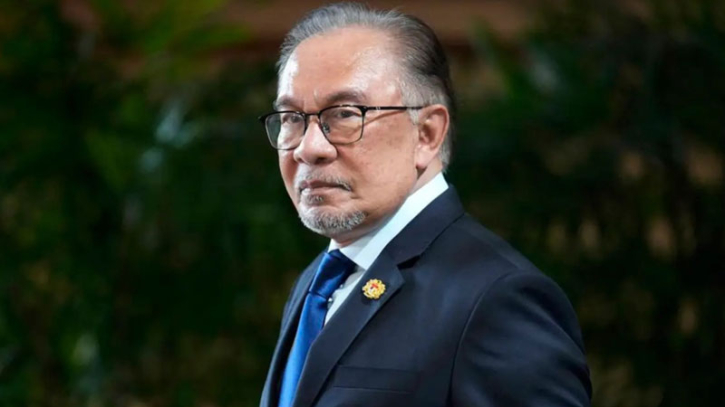Malaysian PM's short visit to Dhaka significant

Malaysian Prime Minister Anwar Ibrahim is set to visit Bangladesh on October 4, 2024. The Prime Minister will visit Bangladesh only for hours after completing his visit to Pakistan. Even though it will be a 'very short' visit with duration of 'four hours maximum' planned at the last moment, both countries are seeing the visit as official one. The visit will marks a pivotal moment in the diplomatic and economic landscape of both nations.
As the first visit by a Malaysian Prime Minister to Bangladesh in nearly 11 years, this brief yet significant engagement is laden with opportunities for strengthening bilateral ties and exploring new areas of cooperation. With a focus on economic, political, and social collaboration, this visit can serve as an opportunity for Bangladesh to overcome the bilateral issues and difficulties it is facing with its bilateral relations with Malaysia, especially in a context when Malaysia has halt visa for foreign workers as well as raiding to oust illegal immigrants.
Strengthening Diplomatic Relations: At the heart of this visit is a longstanding friendship between Prime Minister Anwar and Chief Adviser Prof. Muhammad Yunus. Their relationship, founded on mutual respect and shared goals, is indicative of possible broader ties between Malaysia and Bangladesh. Prof. Yunus, having invited Anwar to visit shortly after assuming his role, highlights the importance of this meeting not only as a diplomatic formality but as a genuine commitment to fostering stronger relations. It is also worth mentioning that Prime Minister Anwar was the first global leader to communicate with the Chief Adviser after assuming his position. This visit also marks the first visit by any head of the state after the formation of interim government in Bangladesh.
The timing of this visit is particularly crucial. As Malaysia prepares to take over the chairmanship of ASEAN in January 2025, it presents Bangladesh with an opportunity to engage more deeply with regional cooperation frameworks. Bangladesh is eyeing to become the dialogue partner in the ASEAN in near future. For that it will require support from member states. Malaysia's Chairmanship and unconditional support for Bangladesh would be leverage for Bangladesh in achieving its next objective in the ASEAN.
Prime Minister Anwar's discussions with Prof. Yunus are likely to cover vital issues, including the ongoing the Rohingya refugee crisis as well. With Malaysia's active participation in ASEAN, there is potential for collaborative efforts in addressing this humanitarian issue that has significant implications for regional stability.
The visit will also strengthen both country's soft influence on diplomatic relation also as the Malaysian delegation headed by their Prime Minister consists of 58 members. For Bangladesh, a Malaysian PM visiting with such large number of delegates- mostly because of his personal relationship with the Chief Adviser will surely increase fraternity with Malaysia. While for Malaysian delegation, it will increase positivity regarding Bangladesh and brotherhood with their Bangladeshi counterparts.
Economic Opportunities: Malaysia currently stands as the eighth largest investor in Bangladesh. The visit may also explore avenues for increased investment and trade.
During the bilateral meeting, discussions on economic cooperation will likely to encompass diverse sectors, including education, technology, and infrastructure. Malaysia's interest in establishing a strong presence in Bangladesh's educational sector is particularly noteworthy. With Malaysian universities already promoting social business ideas through YunusCentres, there is ample scope for academic collaboration that can empower the next generation of Bangladeshi leaders and entrepreneurs.
Moreover, the recent agreement signed by a Malaysian car manufacturer- Perodua with PHP Motors of Bangladesh for vehicle distribution and assembly underscores scope for Malaysia's establishing a manufacturing base in Bangladesh. This could not only generate employment opportunities but also stimulate the local economy and enhance Bangladesh's position as a manufacturing hub in South Asia. In return, such partnerships would help Malaysia to globalize its investment.
Labor Migration and Transparency: Another area of vital discussion could be labor migration. Both Malaysia and Bangladesh share mutual needs in this domain; while Malaysia requires a steady flow of workers to support its growing economy, Bangladesh seeks to facilitate this demand. The emphasis on transparent labor processes can foster trust and security for workers from Bangladesh, enhancing their prospects and ensuring their rights are protected.
Recently, Malaysia has taken strict policy regarding foreign workers. It has also started to conduct raid to oust the illegal migrant workers there. As Bangladesh has been sending workers to Malaysia for a long time now, flawed recruitment process by Bangladeshi local agencies as well as transnational scammers have capitalized on the flow of workers. As a result, many Bangladeshi workers have become illegal migrants there.
The potential for collaboration in this aspect could be establishing an enhanced medical network among Malaysian medical service and their counterparts in Bangladesh. As medical tourism continues to grow globally, Bangladeshi patients can benefit from Malaysia's expertise in critical diseases.
By focusing on collaborative initiatives across various sectors, Bangladesh can benefit significantly from this engagement if cultivated properly. The combination of shared interests, long-standing friendships, and mutual respect can lead to transformative changes thatbenefit mutually.
Lastly, Prime Minister Anwar's visit is more than a fleeting engagement; it is a strategic opportunity for Bangladesh to address its concerns in bilateral relations and elevate its position in the regional politics vis-à-vis ASEAN and the Rohingya crisis, and unlock new avenues for collaboration. With proactive engagement and commitment to cooperation, the future can be promising for both Bangladesh and Malaysia.
The writer completed BBA and MBA from Department of Finance, University of Dhaka.
.png)




